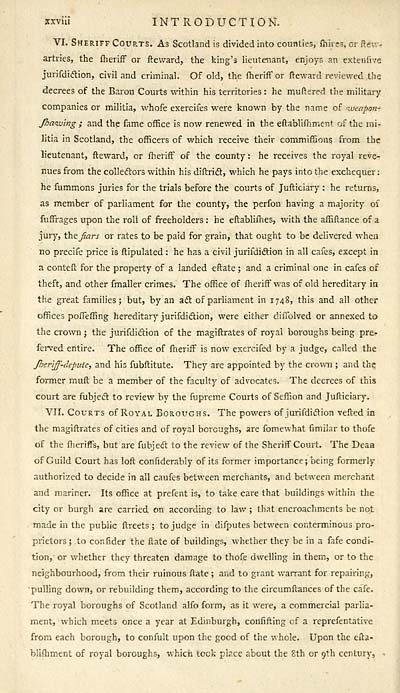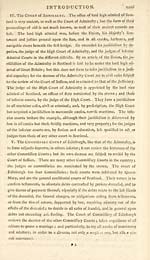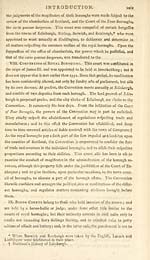Gazetteer of Scotland
(36) Page xxviii
Download files
Complete book:
Individual page:
Thumbnail gallery: Grid view | List view

sxviii INTRODUCTION.
VI. Sheriff Courts. As Scotland is divided into counties, {hires, or ftew-
artries, the fherifF or fteward, the king's lieutenant, enjoys an extenlive
jurifdiction, civil and criminal. Of old, the fherifF or Reward reviewed the
decrees of the Baron Courts within his territories : he muftered the military
companies or militia, whofe exercifes were known by the name of nveapon-
Jhaiuing ; and the fame office is now renewed in the eftablifhment of the mi-
litia in Scotland, the officers of which receive their commiffions from the
lieutenant, fteward, or fherifF of the county: he receives the royal reve-
nues from the collectors within his diftrict, which he pays into the exchequer:
he fummons juries for the trials before the courts of Jufticiary : he returns,
as member of parliament for the county, the perfon having a majority of
fuffrages upon the roll of freeholders : he eftablifhes, with the affifl.ar.ee of a
jury, the fiars or rates to be paid for grain, that ought to be delivered when
no precife price is ftipulated : he has a civil jurifdiction in all cafes, except in
a conteft for the property of a landed eftate ; and a criminal one in cafes of
theft, and other fmaller crimes. The office of fherifF was of old hereditary in
the great families; but, by an act of parliament in 1748, this and all other
offices pofTeffing hereditary jurifdiction, were either diffolved or annexed to
the crown ; the jurifdiction of the magiftrates of royal boroughs being pre*-
ferved entire. The office of fherifF is now exercifed by a judge, called the
Jheriff-deputc, and his fubftitute. They are appointed by the crown ; and the,
former muft be a member of the faculty of advocates. The decrees of this
court are fubject to review by the fupreme Courts of Seffion and Jufticiary.
VII. Courts of Royal Boroughs. The powers of jurifdiction veiled in
the magiftrates of cities and of royal boroughs, are fomewhat fimilar to thofe
of the fheriffs, but are fubject to the review of the Sheriff Court. The Deaa
of Guild Court has loft confiderably of its former importance; being formerly
authorized to decide in all caufes between merchants, and between merchant
and mariner. Its office at prefent is, to take care that buildings within the
city or burgh are carried on according to law ; that encroachments be no.t
made in the public ftreets ; to judge in difputes between conterminous pro-
prietors ; .to confider the Rate of buildings, whether they be in a fafe condi-
tion, or whether they threaten damage to thofe dwelling in them, or to the
neighbourhood, from their ruinous ftate ; and to grant warrant for repairing,
"pulling down, or rebuilding them, according to the circumftances of the ca'fe.
The royal boroughs of Scotland alfo form, as it were, a commercial parlia-
ment, which meets once a year at Edinburgh, confuting of a reprefentative
from each borough, to confult upon the good of the whole. Upon the efta-
blifhment of royal boroughs, which took place about the 8th or 9th century, -
VI. Sheriff Courts. As Scotland is divided into counties, {hires, or ftew-
artries, the fherifF or fteward, the king's lieutenant, enjoys an extenlive
jurifdiction, civil and criminal. Of old, the fherifF or Reward reviewed the
decrees of the Baron Courts within his territories : he muftered the military
companies or militia, whofe exercifes were known by the name of nveapon-
Jhaiuing ; and the fame office is now renewed in the eftablifhment of the mi-
litia in Scotland, the officers of which receive their commiffions from the
lieutenant, fteward, or fherifF of the county: he receives the royal reve-
nues from the collectors within his diftrict, which he pays into the exchequer:
he fummons juries for the trials before the courts of Jufticiary : he returns,
as member of parliament for the county, the perfon having a majority of
fuffrages upon the roll of freeholders : he eftablifhes, with the affifl.ar.ee of a
jury, the fiars or rates to be paid for grain, that ought to be delivered when
no precife price is ftipulated : he has a civil jurifdiction in all cafes, except in
a conteft for the property of a landed eftate ; and a criminal one in cafes of
theft, and other fmaller crimes. The office of fherifF was of old hereditary in
the great families; but, by an act of parliament in 1748, this and all other
offices pofTeffing hereditary jurifdiction, were either diffolved or annexed to
the crown ; the jurifdiction of the magiftrates of royal boroughs being pre*-
ferved entire. The office of fherifF is now exercifed by a judge, called the
Jheriff-deputc, and his fubftitute. They are appointed by the crown ; and the,
former muft be a member of the faculty of advocates. The decrees of this
court are fubject to review by the fupreme Courts of Seffion and Jufticiary.
VII. Courts of Royal Boroughs. The powers of jurifdiction veiled in
the magiftrates of cities and of royal boroughs, are fomewhat fimilar to thofe
of the fheriffs, but are fubject to the review of the Sheriff Court. The Deaa
of Guild Court has loft confiderably of its former importance; being formerly
authorized to decide in all caufes between merchants, and between merchant
and mariner. Its office at prefent is, to take care that buildings within the
city or burgh are carried on according to law ; that encroachments be no.t
made in the public ftreets ; to judge in difputes between conterminous pro-
prietors ; .to confider the Rate of buildings, whether they be in a fafe condi-
tion, or whether they threaten damage to thofe dwelling in them, or to the
neighbourhood, from their ruinous ftate ; and to grant warrant for repairing,
"pulling down, or rebuilding them, according to the circumftances of the ca'fe.
The royal boroughs of Scotland alfo form, as it were, a commercial parlia-
ment, which meets once a year at Edinburgh, confuting of a reprefentative
from each borough, to confult upon the good of the whole. Upon the efta-
blifhment of royal boroughs, which took place about the 8th or 9th century, -
Set display mode to: Large image | Transcription
Images and transcriptions on this page, including medium image downloads, may be used under the Creative Commons Attribution 4.0 International Licence unless otherwise stated. ![]()
| Gazetteers of Scotland, 1803-1901 > Gazetteer of Scotland > (36) Page xxviii |
|---|
| Permanent URL | https://digital.nls.uk/97343860 |
|---|

